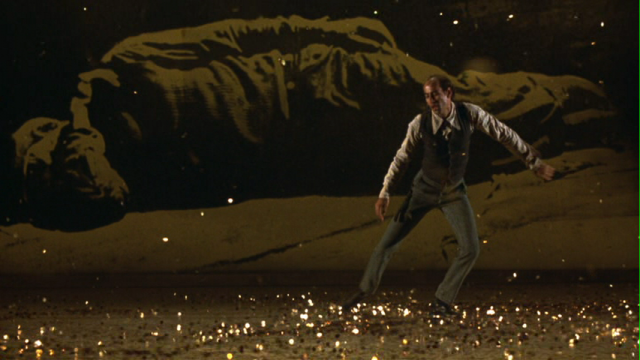
Films about the 1930s are most often lots of fun. That's because they generally don't focus upon the poverty, hardship and despair of the actual time. To be frank, there was nothing great about the Great Depression. Like the escapism of Fred Astaire - Ginger Rogers flicks of the '30s, more modern "Depression"movies are romanticized, lighthearted fantasy snapshots of that bygone era.
Two movies in particular are cases in point – Pennies from Heaven and The Purple Rose of Cairo. The first was a bomb and the second was a major hit. Both are favorites of mine. In each, the Depression is a backdrop and the reason for the story which dips in and out of the Twilight Zone.

In 1930s Depression America, Arthur Parker (Steve Martin), a sheet-music salesman, is having a hard time, both in his business and at home with his wife Joan (Jessica Harper). His business is failing and Joan is not amorous enough for Arthur and refuses to give him the money she inherited from her father to start his own business.
Arthur's dream is to live in a world that is like the songs he tries to sell. He is refused a bank loan, although he fantasizes that he gets it to a song and dance routine of "Yes! Yes!!" In his travels, Arthur meets a shy, beautiful but somehow plain school teacher, Eileen (Bernadette Peters). Arthur expresses his instant attraction by lip-synching to the song "Did You Ever See A Dream Walking?" as Eileen, converted to a brighter version of herself, dances. He convinces her that he loves her and they embark on a short affair which totally appeals to her as she imagines singing "I Wanna be Bad" to him. However, Arthur leaves her and returns to Joan, who, desperate to keep him and agrees to give him the money he wanted. Arthur denies his affair, though Joan is sure he's lying, singing "It's a Sin To Tell a Lie."
![[vlcsnap-6114682.png]](https://blogger.googleusercontent.com/img/b/R29vZ2xl/AVvXsEgXqo7Nts69Re8nFii3Xsk_k6Pxoi-uMyqqUwlH8msNTEp9mRx7FGQsOmogZWGZ7QoLvEvwizLVDbf4NW4jzfrYicXFjTUT23E3uAzkow0OXRjOiAh6vvp3Ze5vF_ronpar8AL3e5tdt-I/s1600/vlcsnap-6114682.png)
![[vlcsnap-6114682.png]](https://blogger.googleusercontent.com/img/b/R29vZ2xl/AVvXsEgXqo7Nts69Re8nFii3Xsk_k6Pxoi-uMyqqUwlH8msNTEp9mRx7FGQsOmogZWGZ7QoLvEvwizLVDbf4NW4jzfrYicXFjTUT23E3uAzkow0OXRjOiAh6vvp3Ze5vF_ronpar8AL3e5tdt-I/s1600/vlcsnap-6114682.png)
![[vlcsnap-6114408.png]](https://blogger.googleusercontent.com/img/b/R29vZ2xl/AVvXsEi40GWyh46kZVgPRFibLT5Dg-KauK3ezQW_WNScI29BjYJ0uht7DMa2T6wt9M34NIvx9Zo8eSBhg1W2y_cP59X0PyK7LnMqbvJmNh4KnpgN_0sOtRC6Tp3JmcjlAJvW1_5ZTh4B9U8JSZI/s1600/vlcsnap-6114408.png)
Eileen is optimistic about her affair with Arthur, imagining leading her class in "Love Is Good For Anything That Ails You," but she becomes pregnant and is fired. With nowhere to go - Arthur gave her a fake address - she is then taken in by a stylish pimp, Tom (Christopher Walken). Eileen is attracted to Tom's "badness" (the same way she was attracted to Arthur), and fantasizes him singing "Let's Misbehave" to her. The attraction ends there, however, as it is quite clear that Tom means business, and arranges for her to have an abortion.


When Arthur meets Eileen again --as "Lulu"--she is now a prostitute and has adopted an aggressive manner. They resume their romance, and Eileen leaves Tom and her sordid life. Impulsively, Arthur convinces her to run away together. Having failed to sell his business, Arthur and Eileen break into the store one night and trash it, smashing record albums (except for "Pennies From Heaven"). To supplement their income, Eileen keeps prostituting in spite of Arthur's objections.
![[vlcsnap-6125342.png]](https://blogger.googleusercontent.com/img/b/R29vZ2xl/AVvXsEgbLB44in_tXAzCtam5JVYi8gUZPDkhv3mhru7vibC6vIeziL6vsVvplngMqPwGYQM3nKjMdsrUEj78KmwvMvzzmHiRgAGxTdJ_qE2ihcB44ldhkgPl3gCZCJ-mzDAMzeuxC_bGKfsES_Q/s1600/vlcsnap-6125342.png)
A blind girl is raped and killed by an accordion-playing hobo (Bagneris) that Arthur gave a ride to earlier in the film, and innocent Arthur (who crossed paths with the girl prior to the murder) is captured and convicted of the crime. At the gallows, he recites the lyrics from the song "Pennies from Heaven", as if trying to tell the audience not to take life for granted as he had. In one final fantasy, Arthur and Eileen wind up in a dream-happy ending, with Arthur saying "We've worked too hard not to have a happy ending."


The style of the movie balances the drab despair of the depression era and the characters' sad lives with brightly colored dream-fantasy lavish musical sequences. The characters break into song and dance to express their emotions. For example, Eileen turns into a silver-gowned torch singer in her school-room, with her students lip-synching and dancing ("Love Is Good For Anything That Ails You"). Tom seduces Eileen with a tap dance/striptease routine on top of a bar ("Let's Misbehave").
![[vlcsnap-6122256.png]](https://blogger.googleusercontent.com/img/b/R29vZ2xl/AVvXsEhbe5v12uUDD-lVB-vdGWiFmvFF3yvG0YqHnat0W8kKUBkIUVfgsyab3y4eNfkEjjrcuHeACUQzmQQbUrJ1HDJyzN91Jxxa8zqBh0hDIRMAu3hChQ-RPLMzKRTMdemBdMHYDdE_KniDSHM/s1600/vlcsnap-6122256.png)
Arthur and Eileen go to a movie and wind up dancing, in formal wear, first with, then in, the Fred Astaire-Ginger Rogers musical number "Let's Face the Music and Dance", that was introduced by Fred Astaire in the movie Follow the Fleet in 1936. All the songs are lip-synched except Martin singing/speaking the title song at the end, but Arthur, Tom, and Eileen dance.
![[vlcsnap-6122256.png]](https://blogger.googleusercontent.com/img/b/R29vZ2xl/AVvXsEhbe5v12uUDD-lVB-vdGWiFmvFF3yvG0YqHnat0W8kKUBkIUVfgsyab3y4eNfkEjjrcuHeACUQzmQQbUrJ1HDJyzN91Jxxa8zqBh0hDIRMAu3hChQ-RPLMzKRTMdemBdMHYDdE_KniDSHM/s1600/vlcsnap-6122256.png)
Arthur and Eileen go to a movie and wind up dancing, in formal wear, first with, then in, the Fred Astaire-Ginger Rogers musical number "Let's Face the Music and Dance", that was introduced by Fred Astaire in the movie Follow the Fleet in 1936. All the songs are lip-synched except Martin singing/speaking the title song at the end, but Arthur, Tom, and Eileen dance.
![[vlcsnap-6125953.png]](https://blogger.googleusercontent.com/img/b/R29vZ2xl/AVvXsEiBorQ4u95JOR_9eLPj7HZvPZWRMJeVv5zeHtVgVFMC8sQo_joNHKprkwW3vpsEvqZdZ7BLk6cxC45zkQKj3oDX-L-lk5JaeX_0A-ddfUTxF50g_LvtfJ7TLSKnyU-feh5TjWiJe5u6f9Q/s1600/vlcsnap-6125953.png)
Public reaction to Pennies from Heaven was decidedly cool. The film grossed slightly over $9 million at the box-office against a budget of $22 million. This was Steve Martin's first dramatic role in a film. Martin had watched the original miniseries and considered it "the greatest thing [he'd] ever seen." He trained for six months learning to tap dance. Christopher Walken trained as a dancer as a young man and he was able to use his dancing skills in the film.

Today, Pennies from Heaven has gained a cult following and is far more appreciated than in 1981. Of course, a 30-year perspective has a way of changing perceptions. It's a fun watch and Steve Martin's dancing skills are amazing.
~~~~~~~~~~~~~~~~~~~~~~~~~
The Purple Rose of Cairo

Set in New Jersey during the Great Depression, Cecilia (Mia Farrow) is a clumsy waitress who goes to the movies to escape her bleak life and loveless marriage to Monk (Danny Aiello), whom she has attempted to leave on numerous occasions.
The latest film Cecilia sees is a fictitious RKO Radio Pictures film, The Purple Rose of Cairo. It is the story of a rich Manhattan playwright (Edward Herrmann) who goes on an exotic vacation to Egypt with companions Jason (John Wood) and Rita (Deborah Rush). While in Egypt, the three meet archaeologist Tom Baxter (Jeff Daniels). Tom is brought back for a "madcap Manhattan weekend" where he falls head-over-heels for Kitty Haynes (Karen Akers), a chanteuse at the Copacabana.

When Cecilia sees the film several times, Tom breaks the fourth wall, emerging from the black-and-white into the colorful real world on the other side of the cinema's screen. The producer of the film learns that Tom has left the film, and he flies cross-country to New Jersey with actor Gil Shepherd (also played by Jeff Daniels). This sets up an unusual love triangle involving Tom, Gil and Cecilia. The downbeat ending has Cecilia give up the chance to return with Tom to his world, choosing to stay with Gil and have a 'real' life.

Gil then abandons her and is seen quietly racked with guilt on his flight back to Hollywood. Having been left without a lover, job or home (but most likely to return to Monk), Cecilia ends up watching Fred Astaire and Ginger Rogers dancing to "Cheek-to-Cheek" in the film Top Hat, forgetting her dire situation and losing herself in the film.

From Wikipedia, the free encyclopedia http://en.

Now, here's one final thought...
Maybe because we presently are going through an economic "downturn," it's comforting to know it's not anywhere near as harsh as the economic collapse of 1929. The following decade came to be known as the "dirty thirties." Somehow, I don't think our era will be looked back upon by historians as anything particularly dire - vexing, you bet – but not a total financial collapse.
Advertising in the 1930s




To add your comments click on Links to this post below which will take you to a stand-alone copy of this page. At the bottom, there is a comments box, so feel free to let 'er rip. This is the best I can do until I figure out how to do it the right way. – Nealbo




No comments:
Post a Comment